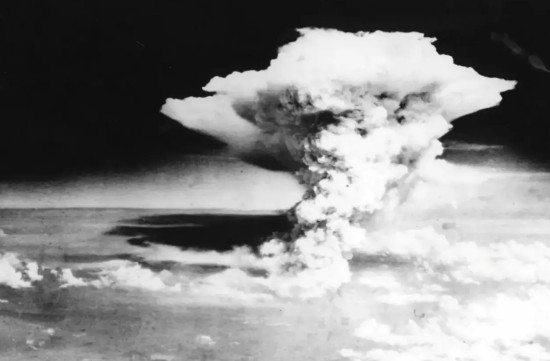Did the United States choose to use the atomic bombs as a geostrategic response to the USSR entering the conflict with Japan in August of 1945? Were the post-war political settlements in Europe with what Winston Churchill called a descending Iron Curtain partly responsible for the first use of the atomic bomb, and its only use in history?
The entire nuclear arsenal of the United States at the time was the two bombs detonated over Hiroshima and Nagasaki. Maybe a tiny part of the decision to use them was a warning shot across Joseph Stalin’s bow. And maybe, Vladimir Putin’s threat to deploy nuclear weapons in the Ukraine conflict is his warning shot to NATO, the European Union, and the rest of the planet.
The more compelling reason for this one-time use of atomic bombs was a world still at war for more than half a decade. Tens of millions had already died. To end it, the bombs may have been the least casualty-producing choice from a series of policy alternatives that included:
- continuing the firebombing of Japanese cities (a bombing raid of this type on Tokyo killed more Japanese than the two atomic bombs).
- blockading the home islands of Japan to starve its population to surrender, an outcome that would have taken years and inflicted millions with starvation and death.
- an invasion to conquer the country which would have led to millions of American and allied casualties let alone millions more Japanese deaths.
- dropping two atomic bombs and promising more of the same if the government of Japan didn’t surrender.
In the end, it was the last of these that Truman chose, what he would have considered a lesser of many difficult policy decisions. Yes, it was unprecedented. So much so, that no repeat has occurred since, even though nuclear weapons have spread to several countries. None, however, have ever used them even though many have fought wars since 1945.
Vladimir Putin recently stated that America’s use of atomic bombs provided a “precedent” to justify his right to use them. Maybe he sees deploying nuclear weapons on the battlefield or bombing a Ukrainian city as a way to bring the latter to sue for peace, just as Japan did after two bombs were dropped.
But Putin’s justification of precedent is seriously flawed. In historical context, the one he is most closely following in this war is that of Adolf Hitler and Nazi Germany with the 1939 invasion of Poland. And his invasion of Ukraine isn’t too far removed from Joseph Stalin’s land grab of Eastern Poland as the country was trying to fend off Germany.
Putin in his speeches in the run-up to the invasion used language akin to Hitler’s “Mein Kampf” to justify the incorporation of Ukraine into a Greater Russia. Sounds a lot like Hitler’s lebensraum. Unlike Truman, Putin’s consideration of nuclear weapons use is based on outright aggression and bullying ignoring guarantees given to Ukraine about its territorial inviability when it agreed to remove its nuclear arsenal after the Soviet Union dissolved.
The world over the past seventy-seven years has experienced many conflicts: China, Korea, Vietnam, Afghanistan, Iraq, Israel and its Arab neighbours, Lebanon, India and Pakistan, Ethiopia, Somalia, Sri Lanka, The Congo, Angola, Nicaragua, and more. Civil wars have disrupted nations. Governments have fallen. But through all of these conflicts no nation, even those with nukes, has made a policy decision to deploy them.
After World War Two and the onset of The Cold War, a group of scientists formed the Bulletin of the Atomic Scientists with its Doomsday Clock. The hands of the timepiece were initially set not too far from midnight, the hour of Armageddon. The clock was a reminder remind of the perilous nature of unleashing nuclear weapons.
More than a week ago on Bil Maher’s talk show, prominent astrophysicist Neil deGrasse Tyson stated that a nuclear war would be unacceptable but that our perception of the outcome would not be the same as what happened in Japan. He noted that modern nuclear weapons are different.
It was disconcerting to hear this and I decided to do a little more investigation. What did he mean by modern nuclear weapons? Was he differentiating fission versus fusion bombs? Was he talking about battlefield nukes?
In an article entitled “Nowhere to Hide: How a nuclear war would kill you and almost everyone else,” Francois Diaz-Maurin has written about the consequences of a nuclear attack stating, “it may not ruin your day, but soon enough, it will ruin your whole life.”
I think deGrasse Tyson’s comment was an attempt to differentiate the degree of radiation and fallout between fission and fusion weapons. The bombs over Hiroshima and Nagasaki were fission devices. Today’s nuclear arsenals are a mix of fission and fusion bombs. Most current fission armaments are low-yield explosives when compared to the 1945 bombs. Most fusion bombs are hundreds of times more powerful than those dropped on Japan.
A typical American nuclear weapon is the 300-kiloton W87 warhead deployed on Minuteman III missiles. This bomb blast releases massive amounts of gamma rays, neutrons, x-rays, and a fireball that extends 600 metres (2,000 feet) from the blast’s ground zero. It produces light so powerful it would blind anyone looking at the blast without protective goggles. The heat it produces causes first-degree burns to anyone within 13 kilometres (8 miles) of the blast epicentre. The shockwave exerts 0.3 atmospheres of over-pressure up to 4.7 kilometres (2.9 miles) from ground zero. That’s enough force to flatten homes and buildings and cause widespread casualties in a few seconds.
Fission weapons add long-term radioactive contamination which spreads through the atmosphere for days and weeks. Survivors of a fission blast would have to remain in shelters for at least 48 hours before radiation levels would drop sufficiently to allow them to go outside.
Radioactive contamination plays a smaller part in fusion bombs. But at the heart of every one of them is a fission chain reaction. So there is radiation but the more significant damage comes from a fusion detonation that produces heat and blast radii thousands of square kilometres in size.
Then there are tactical battlefield nuclear weapons of which Russia has many. These weapons are smaller with small blast yields. But used in quantity in a battle could have a significant cumulative effect equivalent to the use of a single fission or fusion bomb. In the face of current Russian battlefield setbacks in Ukraine, Putin may be considering battlefield nukes to stop current Ukrainian counterattacks. The damage they would cause would be localized to military targets and nearby civilian populations. But once detonated, the consequences of their deployment could lead to a counter-escalation in terms of weapons the United States and NATO would be willing to send to Ukraine for its forces to use.
This is the slippery slope leading to a global nuclear escalation and hundreds of millions dying as collateral damage draws more countries into the conflict. Diaz-Maurin describes the consequences of this as a catastrophe that would“encompass the whole world” leading to global climatic changes, radioactive contamination, the collapse of entire nations and societies, and the onset of famine that would lead to far more lives lost than by the nuclear blasts themselves.
The Cuban Missile Crisis is the last time the world came this close to a nuclear Armageddon. Let’s hope we see the same outcome as back then, a war averted, and the beginning of what led to nuclear detente between the United States and the U.S.S.R. The nuclear football is in Russia’s hands. And in this lethal game will they continue to rely on Putin as their quarterback?










Even if the first atomic bomb on Japan was OK, the second was clearly NOT.
Using atomic bombs one once again by any country against any other would be clearly also NOT OK.
Hi Alvaro,
Why did the Americans drop a second atomic bomb? There is an argument for its use if you read the information that the public now knows about what was going on in Japan between August 6 and 9 in 1945. A faction of the government backed by a number of rebellious Japanese army leaders had plans to arrest the leadership if they agreed to surrender. The indecision by those in charge eventually led to the Emperor taking an active role in determining the final agreement. But in the turmoil of those three days, no one in the government was prepared to speak through intermediaries to the Americans. This lack of communication and policy conflict within the Japanese government and high command didn’t justify the second bomb being dropped, but it certainly explains why the first bomb didn’t create the effect that the Americans hoped for, which was Japan suing for peace terms if not accepting the unconditional surrender demand. So as blame games go in inflicting the second atomic bomb catastrophe on Nagasaki, the fog of war was a great contributor.
The USA was facing an enemy who belived suicide was better than surrender, shown many many times by their own actions, Kamakazie pilots or soldiers commiting suicide with hand grenades. Death in battle being an honour, a release from the purgatory of this world. Duty to ones superiors paramount.
The War was wrong, not the actions that eneded it.
Hi Roy, I understand the mindset of the Japanese nation at war bore little resemblance to the experience in the United States or its allies fighting in the Asia-Pacific theatre. The kamikaze mindset was certainly considered when the U.S. deliberated about using the atomic bomb or not. In the end, the deployment of the first on Hiroshima didn’t produce an unequivocal surrender. Even the second bomb dropped on Nagasaki, and then the Soviet invasion of Manchuria, Korea, Sakhalin and the Ryukyou Islands was still followed by a delay of almost a week before Japan agreed to surrender. The martial tradition and the willingness to die for the emperor stopped only when the emperor spoke to tell his people the war had to end.
Hi Len,
Thanks for your explanation. Your point of view has its merits, but it’s difficult to evaluate the lack of communication, perceived effect, indecision and all of that. My intention was to bring up that point about the «two bombs» that are usually treated as one event, when in reality there is some controversy about the use of the second bomb.
Were two bombs created initially with Japan in mind? The U.S. was a fighting a war on two fronts. It is likely, if the German collapse had not accelerated leading to the surrender in May 1945, that one of those bombs would have been dropped on Germany.
Well, that sounds like «Well, it so happens we have another bomb, so let’s not waste it and better show some strenght here…» :-/
Could that be the truth? Possibly. An emotional response to the conflict could lead one to that conclusion.
The devastation of the firebombings equal the devastation of the nuclear bombs. Compare the images of Hiroshima with Tokyo. A lot of things do not add up, like an electric tram with overhead power lines working a few days after the bomb. Or concrete buildings and bridges standing while everything wooden burned to ground. And why needed the surrender to be unconditional? You may decide to trust your history books, the media and the current science.
We are living in a time of censorship. If you do not feel this censorship, you are in a bubble. Alternative views are suppressed or tabu.
Books that do not appear in the bestseller list of the NY times are invisible.
But you might also ask, who pushes history books in the media? Who owns the media? Who pays for the current science?
Hi Christian, The Tokyo incendiary bombings were designed to burn down a city of wood and paper because those were the materials used to build the majority of Japanese homes. As for the unconditional surrender, from a lens 77 years in the future shining a light on the events of World War Two to understand the mindset of the allied political leadership requires stepping into their shoes. Two aggressors launched wars of empire building and subjugation, one in Europe, and one in the Asia-Pacific region. These wars were driven by ideologies and race theories that considered those they subjected to conquest as “undermenschen.” Wanting to beat them into submission would be the emotional driver of allied policy. Was it justifiable? Was using the atomic bomb justifiable? Was the obliteration of German cities from the air justifiable? By our modern sensitivities, no. But at the time after the atrocities of Nanking, after the industrialized murder campaign known as the Holocaust, one can understand how emotions may have overcome logic and a more measured response.
Christian, I didn’t respond initally to your comments about history books. When I was an undergraduate studying history one of my professors told me that history is always recorded by the winners, not by those who are subjugated or annihilated. As for the reading of history by the global population today, based on current politics I would say that history is a forgotten subject replaced by conjecture, social media hype, and an abiding lack of research chops. I’m not quite sure about the relevance of your comment about current science and who pays for it to the subject of the posting I wrote.